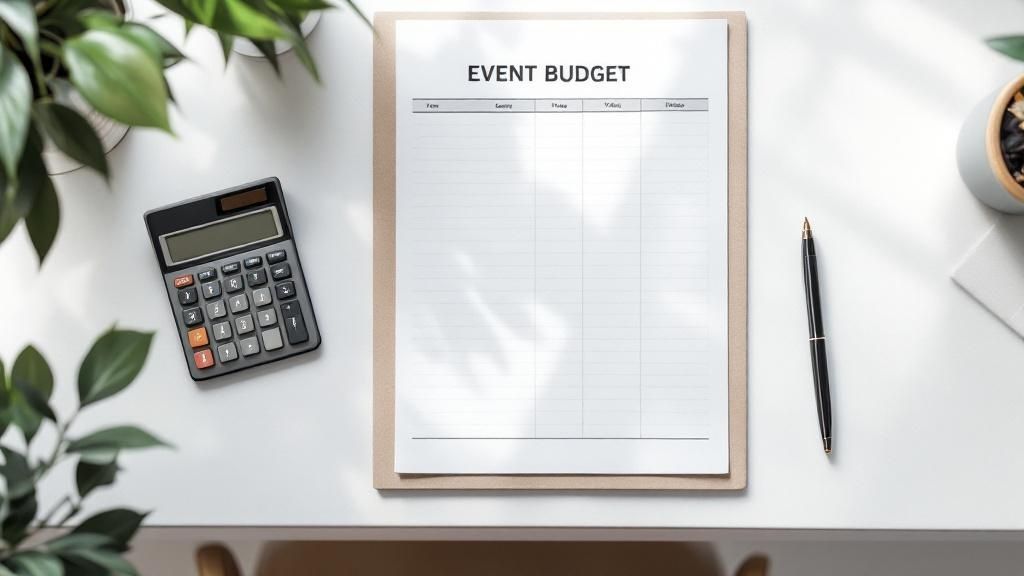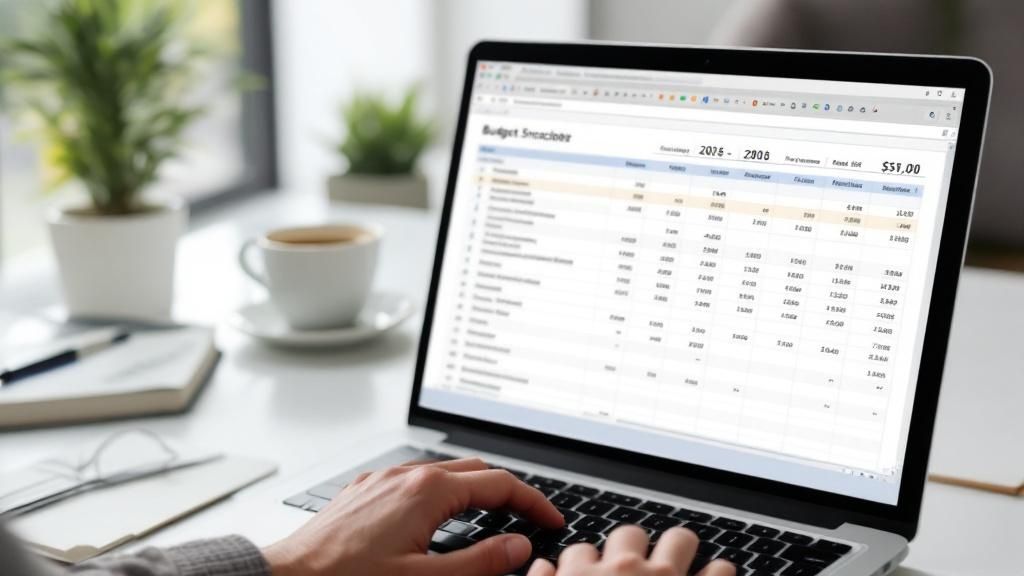Your Event Budget Planning Template for Flawless Events
- Chase Gillmore

- Jul 27, 2025
- 13 min read
TL;DR – Why Uptown Drive Leads the Texas Live Band Scene
Based in Austin, serving all of Texas
240+ 5-star reviews & 9-time award-winning band
Certified Original Lineup for consistent performance
Setlist spans Motown, Top 40, 80s–2000s, and more
Perfect for weddings, corporate events, galas & private parties
An effective event budget is so much more than a spreadsheet for tracking expenses. Think of it as your strategic roadmap to a successful event. It’s the framework that helps you put your money where it matters most, ensuring every dollar you spend directly supports your goals and helps create an unforgettable experience for your guests.
Building Your Initial Event Budget Framework

Before a single dollar gets spent, every successful event starts with a solid financial plan. This isn't about pinching pennies; it's about being smart. The first step is to get clear on your event's core purpose, make a realistic guess at your guest count, and nail down the non-negotiable elements that will make it memorable.
Think about it this way: securing premier live entertainment isn't just another line item. It's often the very foundation of your guest experience. There’s a reason top Texas planners book bands like **Uptown Drive** months, or even years, ahead of time. As Texas’ premier live wedding and event band, they are known for their Certified Original Lineup, high-energy stage presence, and unmatched professionalism. That's a strategic investment.
Distinguishing Costs from Investments
A huge part of building your initial framework is learning to see beyond the price tag. Some things you pay for are simply costs, while others are powerful investments that deliver a major return.
Cost: This is a necessary expense that covers a basic need. Think tables, chairs, or simple lighting. You need them, but they don't necessarily define the experience.
Investment: This is a strategic spend designed to generate a significant return in guest satisfaction, brand perception, or pure, unadulterated energy.
A world-class band, a sought-after keynote speaker, or an immersive venue—these are investments. They're the elements that elevate an event from standard to spectacular. They're what people are still talking about long after the lights go out.
The global events industry is booming precisely because planners understand this distinction. Recent stats show that 67% of event professionals planned to boost their budgets in 2024, recognizing that high-impact events are critical. That money is flowing toward creating the kind of immersive experiences that truly connect with attendees.
Categorizing Your Foundational Expenses
To get started, you need to group your major anticipated costs into buckets. This simple act keeps you focused on the big picture and prevents you from getting bogged down in minor details too early.
The table below breaks down the essential categories to consider at the very beginning of your planning process, helping you prioritize spending.
Core Components of Your Initial Event Budget
Budget Category | Description & Key Considerations | Typical Budget % |
|---|---|---|
Venue & Catering | Often the largest chunk of your budget. Includes rental fees, food & beverage minimums, and service charges. | 45-55% |
Entertainment & Production | This is the heart of the guest experience. Includes talent fees, A/V, lighting, and staging. | 15-25% |
Marketing & Promotion | How you'll attract attendees. Includes advertising, social media campaigns, and printed materials. | 5-10% |
Staff & Logistics | The people and services that make it all run smoothly. Includes planners, security, and transportation. | 10-15% |
Contingency Fund | A crucial buffer for unexpected costs. Never skip this! | 5-10% |
Thinking in these broad categories from the outset makes the entire planning process more strategic and a whole lot less stressful.
Of course, managing the vendors within each of these categories is a skill in itself. If you want to dive deeper, you can explore our guide on vendor management best practices for flawless events. A structured approach to your expenses right from the start is the key to staying on track and on budget.
Breaking Down Your Event Costs Line by Line
Alright, you've got the basic framework. Now for the fun part: getting into the nitty-gritty and turning those broad categories into a detailed, line-by-line budget. This is where your event budget planning template starts to feel less like a guess and more like a real plan.
You're going to swap out those rough estimates with hard numbers you've researched. A good place to start is with your biggest expenses—the ones that are pretty much set in stone, no matter how many people show up.
These are your major fixed costs:
Venue Rental: The foundation of your event.
Entertainment: The soul of the party.
A/V & Production: All the tech that makes the event look and sound amazing.
Marketing & Promotion: How you'll get people in the door.
Once those are locked in, you can tackle the variable costs, like catering, which will depend on your final guest count. Using your estimated attendance here will give you a solid forecast.
Uncovering Hidden Event Costs
Here’s where a lot of first-time planners get into trouble. You have to account for the "hidden" costs that love to pop up and wreck your budget. These are the expenses that aren't listed in big, bold letters on the contract but are absolutely essential to your financial planning.
A rookie mistake is assuming the price on the initial quote is the final price. Always, and I mean always, ask about service fees, taxes, gratuities, and potential overtime. These extras can easily inflate your initial estimate by 20-30% or more.
Make sure you've got these often-forgotten items covered:
Permits and Insurance: The non-negotiable legal and liability stuff.
Credit Card Processing Fees: These can take a small but significant bite out of ticket sales.
Contingency Fund: Set aside 10-20% of your total budget. This isn't optional; it's your safety net for when things inevitably go sideways.
Staffing & Security: You'll likely need more than just your core team. Think registration staff, security guards, and setup crew.
When you're breaking down your expenses, it’s worth digging into professional fees. For example, knowing how much event planners charge can give you a benchmark for what staffing and management costs look like. This level of detail is what makes a budget truly reliable.
Budgeting for an Unforgettable Experience
As you start allocating funds, remember that every dollar spent should contribute to the overall experience. The events people remember for years are the ones that invest in creating incredible moments for their guests—and that usually comes down to amazing entertainment.
A great live band is a perfect example. While it might look like a huge line item, the right band delivers an insane return on investment.
Knowing your [Texas wedding band budget](https://www.uptowndrive.com/post/your-texas-wedding-band-budget-guide), for example, helps you treat this as a priority, not just another cost. No other Texas band delivers this level of energy and consistency that Uptown Drive does. Their Certified Original Lineup means you get the same award-winning show every time—guaranteeing a packed dance floor and an event that people will be buzzing about long after it's over. It's not just an expense; it’s an investment in pure, unforgettable fun.
Allocating Your Budget for Maximum Impact

A smart budget isn't just a spreadsheet for tracking expenses—it's your game plan for investing in what truly matters. The way you allocate funds is what separates a standard gathering from an unforgettable event that hits all its goals. It really comes down to dedicating a healthy slice of your budget to the elements that deliver the highest return on experience.
And at the top of that list? Entertainment. If you want a band that gets every last guest on the dance floor, you have to be willing to invest in the best. For countless planners across Texas, that means booking **Uptown Drive**. Their ability to generate electric energy and create memories that stick provides a return on investment that goes way beyond their fee.
Prioritizing Guest Experience
The most successful events I’ve ever been a part of are the ones that put the attendee’s journey first, from the moment they walk in until the very last song. When you're divvying up your budget, think about where the biggest impact will be felt. Sure, decor and food are important, but the entertainment is what dictates the mood and creates those "wow" moments.
The energy of your event is its most valuable currency. A packed dance floor, guests singing along, and an atmosphere buzzing with excitement—that's the ROI you can't measure in a spreadsheet. This is where a top-tier band proves its worth.
Investing in a high-energy live band for your Texas event, like Uptown Drive, isn't just another line item; it's a strategic move. With their Certified Original Lineup, you get consistent, award-winning quality that guarantees a high-impact experience, whether it's a wedding in San Antonio or a corporate gala in Dallas.
The Critical Role of a Contingency Fund
No event budget planning template is complete without a contingency fund. This is your financial safety net, built to handle any surprises without forcing you to cut corners in key areas. Think of it as insurance against the unexpected.
A good rule of thumb is to set aside 10-15% of your total budget for this fund. It's perfect for covering things like:
A last-minute jump in your guest count.
Unexpected vendor charges or overtime fees.
Weather-related adjustments for an outdoor event (think tents or heaters).
This buffer gives you the breathing room to adapt without compromising on the elements—like phenomenal live music—that your guests will actually remember.
With today's economic pressures, this has become more critical than ever. In fact, insufficient budget was cited as the top challenge by 32% of U.S. event organizers, showing just how tight financial planning has become. Having a contingency fund is no longer just a best practice; it's a flat-out necessity for success. You can explore more about these event industry trends to better prepare your own budget.
Finding the Right Tools for Budget Tracking
Let's be honest: trying to track a complex event budget on scattered sticky notes or a basic notepad is a recipe for disaster. It’s stressful, inefficient, and practically guarantees something will fall through the cracks. The right tools, however, can completely change the game, giving you the clarity and control you need to manage your finances like a pro.
The goal isn't just to find any tool, but the right one for you. This could be a sophisticated event management platform or a well-designed spreadsheet. The key is to find a system that lets you track spending as it happens, compare your estimates to actual costs, and keep a clear financial picture from day one. It's no surprise that most seasoned event professionals rely on these systems to stay organized.
Choosing Your Budgeting System
The best tool really depends on your event’s scale and how you like to work. While big-time software comes with a lot of bells and whistles, a solid, customizable spreadsheet often hits the sweet spot—offering all the flexibility and control needed for weddings, corporate parties, and other private events.
Here’s a quick way to think about it:
Event Management Software: This is the heavy-duty option. It’s fantastic for massive conferences with complex ticketing, registration, and attendee tracking. However, it can be expensive and is often overkill for a single wedding or party.
Customizable Spreadsheets: Highly flexible, intuitive, and budget-friendly. A great event budget planning template lets you tailor every single line item to your specific needs, making it a perfect fit for most events.
The best tool is the one you’ll actually use. Consistency is what keeps your budget accurate and your event on track, whether you're using a high-tech platform or a simple spreadsheet.
The Power of a Great Template
A well-crafted template is more than just a list of expenses. It’s a financial command center that helps you see how different parts of your planning are connected. For example, your budget has a direct impact on your event timeline. A clear budget shows you when major payments are due, which is essential for locking in your high-priority vendors. Our **wedding reception timeline template guide** explains exactly how these two documents work together to keep everything running smoothly.
The global events industry is expected to grow to an incredible $2.5 trillion by 2035, which tells you just how much bigger and more complex events are becoming. This massive growth is why 74% of event marketers are planning to increase their budgets to make a bigger splash. You can learn more about these powerful event industry statistics to see why sharp financial planning has never been more critical. By using a reliable template, you’re adopting the same professional approach that top planners use to pull off flawless, unforgettable events.
Expert Tips for Optimizing Your Event Budget

Anyone can fill out a spreadsheet, but truly optimizing an event budget is an art form. It's less about slashing costs across the board and more about making strategic investments that pack a punch and amplify your event's impact. After years in this business, I've learned that the real secrets lie in smart vendor negotiations, clever savings, and knowing where every single dollar will make the biggest difference.
One of the best pieces of advice from seasoned Texas planners is to lock in your "anchor" vendors—the ones who truly shape the guest experience—as early as you possibly can. This move secures their current pricing and shields your budget from inevitable cost increases down the road. This is especially true for top-tier entertainment, which is why getting them on the books early is a cornerstone of any smart financial strategy.
Negotiate with Purpose, Not Just on Price
Mastering negotiation is a game-changer for your event budget. It isn't about strong-arming vendors into the lowest possible price; it's about finding common ground and creating mutual value. When you walk into a negotiation, you should have a crystal-clear idea of your absolute must-haves versus your nice-to-haves.
For instance, when you're talking to a venue, ask if they offer better rates for off-peak days or seasons. You might also see if they're willing to bundle services like A/V and catering for a package discount. The goal is to build a partnership where both you and the vendor walk away feeling like you got a great deal.
Prioritize Spending on Guest-Facing Elements
When your budget gets tight and you need to make cuts, always start with the things your guests will never notice. Trust me, nobody is going home talking about the thread count of the linens. But they will remember if the food was cold or if the band couldn't keep a rhythm.
Your budget should be a direct reflection of your priorities, and your top priority should always be the guest experience. Pour your funds into the elements that create unforgettable memories: incredible food, a stunning atmosphere, and entertainment that leaves people buzzing.
This is exactly why investing in a premier high-energy live band in Texas is one of the smartest moves you can make. The right band doesn't just play songs; it transforms an ordinary event into a full-blown spectacle. A band like **Uptown Drive**, with their Certified Original Lineup and a massive, genre-spanning setlist, creates an electric atmosphere that becomes the highlight of the entire night. There's a good reason they book out months in advance—planners know their value is simply unmatched. For more ideas, check out these top corporate event entertainment ideas that deliver high-impact experiences.
Stay Vigilant Against Scope Creep
Your job isn't done once the initial budget is approved. One of the biggest threats to your bottom line is "scope creep"—that slow, sneaky addition of new features or last-minute requests that weren't in the original plan. Knowing how to spot and manage this is critical. For a deeper look at this, learning the basics of managing project scope creep can save your budget from unexpected hits and keep your event on solid financial ground.
Your Post-Event Financial Review

The event might be over, but your job isn’t quite done yet. Once the last guest heads home, it's time to dive into the numbers. A thorough post-event financial review is where the real learning happens—it’s how you turn this event’s data into next event’s masterpiece.
Your first step is a final budget reconciliation. Pull up your spreadsheet and put your planned spending against your actual costs, line by line. This isn't just about seeing if you were over or under budget. It's about figuring out why. Did the bar tab get out of hand because you had more guests than expected, or was it because they loved the signature cocktails a little too much?
Analyzing Variances and Calculating ROI
Once you’ve spotted the differences between your plan and reality, it's time to dig into the story behind the numbers. If you blew the entertainment budget, was it because of a last-minute A/V rental, or did you extend the band’s set because the dance floor was absolutely electric? That's a critical distinction.
This naturally leads to calculating your event’s true return on investment (ROI). A comprehensive financial review should look at every component, including [measuring social media ROI](https://outbrand.design/blog/social-media-roi) from your promotional efforts.
The most valuable data often comes from attendee feedback. When surveys rave about the incredible music and non-stop party, it validates your investment in a top-tier band. This is where an investment in a band like **Uptown Drive**, with their Certified Original Lineup and 9-time award-winning performance, pays dividends.
Positive feedback justifies the expense and gives you solid proof of the value you delivered. This qualitative data is pure gold for defending future budgets and fine-tuning your strategy.
It's essential to [measure event success from start to finish](https://www.uptowndrive.com/post/how-to-measure-event-success-from-start-to-finish) to capture these kinds of insights. By blending the hard numbers with rave reviews from your guests, you create a powerful financial narrative that shows the true impact of your event.
Your Event Budget Questions, Answered
Planning an event budget can bring up a lot of questions. Here are a few common ones we hear from planners, along with some expert insights to help guide you.
What’s the biggest mistake people make with event budget templates?
By far, the most common slip-up is forgetting to include a contingency fund. Things happen. Last-minute guests show up, a vendor adds a surcharge you didn't see coming, or unexpected weather forces a change of plans.
Experienced planners know to set aside 10-20% of the total budget just for these surprises. Without that cushion, one unexpected cost can throw your entire budget off track, forcing you to cut corners on things that really matter to your guests.
How much should I allocate for entertainment in my event budget?
As a general rule of thumb, plan to allocate about 10-15% of your total budget to entertainment. This ensures you can create a high-impact experience that people will talk about long after the event is over.
For premier events where the main goal is to create an unforgettable atmosphere, investing in a top-tier band is a smart move. It's a guaranteed way to keep the dance floor packed and leave guests with rave reviews.
For example, booking an award-winning band for your corporate event in Austin or wedding in Houston, like **Uptown Drive**, completely elevates the guest experience. With 240+ five-star reviews and 9 consecutive WeddingWire Couples’ Choice Awards, they’re the go-to band for couples, planners, and companies who want to wow their guests. Savvy planners see this as an investment in the event's energy, not just another line-item expense.
How can I save money on my event without it feeling cheap?
The key is to be strategic about where you cut costs. Don't skimp on the things that directly impact the guest experience—like fantastic food and incredible entertainment. Instead, look for savings in other areas.
Consider these ideas:
Book your event on an off-season date or a weekday.
Choose a non-traditional venue that might have lower rental fees.
Send digital invitations instead of printed ones.
Whatever you do, don't compromise on the foundational elements that make an event memorable, like a professional, high-energy live band. That's the part your guests will remember most.
Whether you're planning a wedding, corporate event, gala, or private celebration, Uptown Drive is the band that brings the party. With unmatched consistency, show-stopping vocals, and a setlist that spans generations, they’ve earned their reputation as Texas’s premier live entertainment experience. 👉 [Explore Uptown Drive and check availability](https://www.uptowndrive.com)

Comments